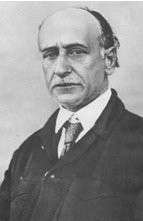Boris Zhitkov
Boris Stepanovich Zhitkov (Russian: Бори́с Степа́нович Житко́в) (11 September [O.S. 30 August] 1882 — 19 October 1938) was a Russian author, mainly of children's books.
Boris Zhitkov | |
|---|---|
 Boris Zhitkov | |
| Born | September 11 [O.S. August 30] 1882 Novgorod, Russian Empire (present-day Russia) |
| Died | 19 October 1938 (aged 56) Moscow, USSR |
| Occupation | Novelist & Playwright |
Biography
Zhitkov was born in Novgorod; his father was a mathematics teacher and his mother a pianist. His works include numerous books in which he, in a figurative form, described various professions. His books are based on his rich experience as a sailor, ship captain, scientist, traveler and explorer. Between 1916 and 1924 he was a sailor and, later, a ship's captain. He also worked as a navigator, an ichthyologist, a metal worker, a shipbuilding engineer, a teacher of physics and drafting, and a technical college headmaster.
In 1924 Zhitkov started to be published and soon became a professional writer. He is best known for the hugely successful children's travel book What I Saw (Russian: Что я видел) about the summer vacation adventures of a curious little boy nicknamed Pochemuchka. He was a close friend of Korney Chukovsky, who wrote in his diary entry for 28 December 1931:
Zhitkov is all upset about the self-flagellation going on among critics at the Writers' Union. He says that at the meeting where Eikhenbaum was asked to practice self-criticism, Eikhenbaum responded, "Self-criticism should be practiced before one writes, not after." [...] Zhitkov's interpretation of the now famous meeting runs as follows: "We're all just so many sons of bitches, so let's pull down our pants and let ourselves be whipped."[1]
Zhitkov's historical novel about the 1905 Revolution, Viktor Vavich (Russian: Виктор Вавич), published posthumously in 1941, was immediately destroyed and republished in 1999 only thanks to Lydia Chukovskaya having saved a copy; Boris Pasternak called it "the best thing that has ever been written about 1905; it's shameful that nobody knows this book."[2]
Zhitkov also featured as a character in Samuil Marshak's children's poem "Post". The poem was adapted for screen in a 1964 animated film, where Zhitkov was voiced by actor Erast Garin.
On July 10, 1939, Pravda, the newspaper of the Communist Party, ran a feature on him in which his book 'What I saw' was very much praised. <Pravda, July 10, 1939, p. 6>
Publications
Zhitkov B. Angry Sea. — 1924
Zhitkov B. Sea Stories. — 1925
Zhitkov B. Black Sails. — 1927
Zhitkov B. Heads or Tails. — 1928
Zhitkov B. Locomotives. — 1928
Zhitkov B. Boa Constrictor. — 1928
Zhitkov B. Stone Seal. — 1931
Zhitkov B. Sea Stories. — 1931
Zhitkov B. Sea Short Stories. — 1935
Zhitkov B. Short Stories about Animals. — 1935
Zhitkov B. Sea Stories. — 1937
Zhitkov B. What I Saw. — 1939
Zhitkov B. Short Stories. — 1940
Zhitkov B. Short Stories about Animals. — 1940
Zhitkov B. Viktor Vavich. — 1941
Zhitkov B. Short Stories about Technology. — 1942
Zhitkov B. Red Commander. — 1956 — (My First Books).
Zhitkov B. How I Hunted the Little Fellows / Illustrations by Paul O. Zelinsky. - 1979
Zhitkov B. About an Elephant: Short Stories / Illustrations by N. Petrova. — 1980
Zhitkov B. Seven Fires: Sketches, Short Stories, Narrative, Plays — 1982
Zhitkov B. Selected Works (Introductory article by K. I. Chukovsky). — 1988
Zhitkov B. Selected works (Composition, introductory article and notes by V. Glotser). — 1989
Zhitkov B. Short Stories about Animals. — 1989
Zhitkov B. Short Stories for Children. — 1998
Zhitkov B. Viktor Vavich. — 1999
Zhitkov B. How I Used to Catch Little Men: Short Stories. — 2001
Zhitkov B. Viktor Vavich. — 2007
Zhitkov B. I Will Mend My Ways!. — 2011
Zhitkov B. Magazine for Kids "Vorobey" ("Sparrow").
References
- Kornei Chukovsky, Diary, 1901-1969 (Yale University Press, 2005: ISBN 0-300-10611-4), p. 262.
- Lydia Chukovskaya, Записки об Анне Ахматовой (YMCA-Press, 1984), p. 547: "Это лучшее, что написано когда-либо о 905 годе. Какой стыд, что никто не знает эту книгу."
External links
- Biography at Russia-InfoCentre (in English)
- Works by Boris Zhitkov (in Russian)
- Boris Zhitkov at Library of Congress Authorities, with 23 catalogue records (some under "Zhitkov, Boris Stepanovich", some "from old catalog")